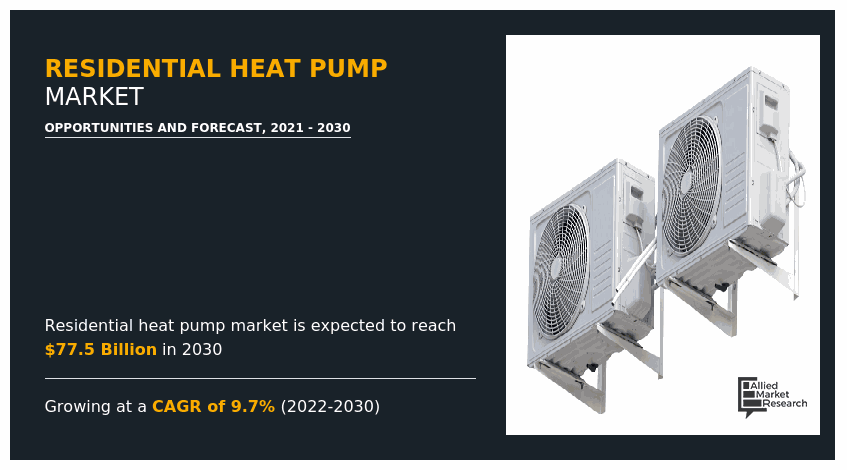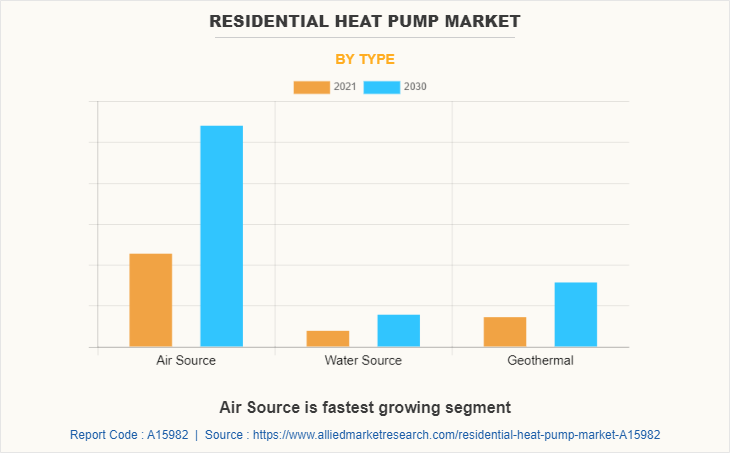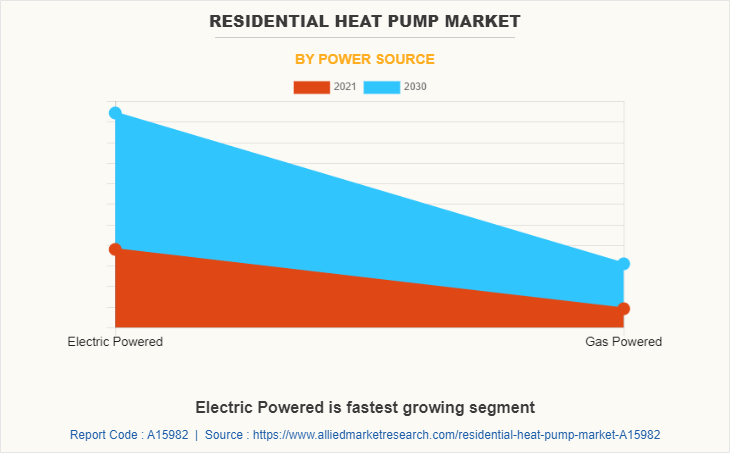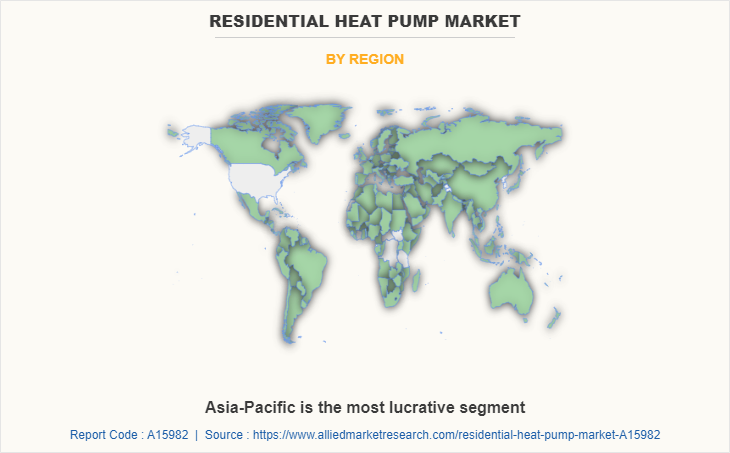Residential Heat Pump Market Research, 2030
The global residential heat pump market was valued at $33.5 billion in 2021, and is projected to reach $77.5 billion by 2030, growing at a CAGR of 9.7% from 2022 to 2030. Residential heat pumps are alternate energy sources to furnaces and air conditioners. Heat pumps transfer heat from a cool to a warm space using electricity, thereby, cooling the cool space and warming the warm space. Residential heat pumps can efficiently produce pleasant temperatures for home because they transfer heat rather than generating it.

Heat pumps, in general, are basically of three types, based on ducts. They are air-to-air, water-source, and geothermal heat pumps. They concentrate heat collected from air, water, or earth outside home for use inside.
Heat pumps are more popular in the region of temperate climate where the temperature rarely falls below the freezing point. They can also be paired with furnaces in colder climates for energy-efficient heating. When the outside temperature goes too low for the heat pump to function properly, the system falls back on the furnace to provide heat. This type of system is referred to as a dual fuel system since it is both energy and cost efficient. The report highlights different factors that impact the growth of the global market such as key drivers, restraints, growth opportunities, and the role of different key players.
The global residential heat pump market is segmented on the basis of type and power source. By type, the market is classified as air source, water source, and geothermal. By power source, the market is classified electric powered and gas powered. By region, the market is analyzed across North America, Europe, Asia-Pacific, and LAMEA.
The key players profiled in this report include Midea Group, Johnson Controls, Daikin, Carrier Corporation, Glen Dimplex, NIBE, Stiebel Eltron, Viessmann, Mitsubishi Electric Corporation, and Danfoss.

By type, the air source sub-segment dominated the global residential heat pump market in 2021 and is projected to be the fastest-growing sub-segment during the forecast period. Air source, for residential heat pump, is considered to be environment efficient heating medium as it transfers heat from air source without any carbon emissions. Thus, it is considered an ideal choice for residential heating.

By power source, the electric powered sub-segment dominated the global residential heat pump market in 2021 and is also projected to be the fastest-growing segment during the forecast period. The growth of electric powered sub-segment is attributed to the fact that electric powered residential heat pump is easy to operate and requires electricity to run. Thus, the chances of harmful gas generation is entirely eliminated in the process. This way, the residential heat pump becomes environment friendly and less expensive.

By region, Asia-Pacific dominated the global residential heat pump industry in 2021 and is projected to remain the fastest-growing sub-segment during the forecast period. This is attributed to numerous factors such as growing demand for residential heat pumps among people due to cooler temperatures in most part of the region.
IMPACT OF COVID-19 ON THE GLOBAL RESIDENTIAL HEAT PUMP MARKET
- Residential heat pumps are largely installed in home areas for heating the indoors. However, the manufacturing facilities of heat pumps have been highly impacted by lockdown and strict regulations imposed due to the COVID-19 pandemic and recorded a huge decline in 2020 due to less workforce and disrupted supply chain.
- COVID-19 impacted almost all industries by hindering various industrial operations and disrupting the supply chain. Maximum companies halted their operations due to fewer resources. Therefore, a major growth decline was observed in the global residential heat pump market size due to the impact of COVID-19.
- Furthermore, the supply of raw materials such as iron and sensors was decreased due to transportation restrictions, which, in turn, adversely affected the manufacturing of residential heat pumps, thereby affecting the global market.
According to the United Nations Industrial Development Organization (UNIDO), 30.0%–70.0% of pre-COVID-19 workforce of various industries, such as electrical and other third-party vendors migrated to their hometowns due to uncertainties and loss of income during the lockdown. This unavailability or less availability of workforce is expected to directly affect the production and manufacturing activities, thereby resulting in decline in home equipment manufacturing industry, which in turn, is expected to decline the residential heat pump market share during the forecast period.
KEY BENEFITS FOR STAKEHOLDERS
- The report provides an in-depth analysis of the global residential heat pump market trends along with the current and future market forecast.
- This report highlights the key drivers, opportunities, and restraints of the market along with the impact analyses during the forecast period.
- Porter’s five forces analysis helps analyze the potential of the buyers & suppliers and the competitive scenario of the global residential heat pump market forecast for strategy building.
- A comprehensive global residential heat pump market analysis covers factors that drive and restrain the residential heat pump market growth.
- The qualitative data in this report aims on market dynamics, trends, and developments.
Residential Heat Pump Market Report Highlights
| Aspects | Details |
| By Type |
|
| By Power Source |
|
| By Region |
|
| Key Market Players | stiebel eltron ag, Glen Dimplex Heating & Ventilation (GDHV), Mitsubishi Electric Corporation, viessmann, NIBE Group, Daikin Industries Ltd., Midea Group Co., Ltd., Johnson Controls International plc, carrier corporation, Danfoss |
Analyst Review
According to analysts, the global residential heat pump market possesses a substantial scope for growth in the future. Continuous increase in demand for residential heat pump installation in residential sectors, owing to growing demand for a comfortable temperature in cooler areas is expected to drive the growth of residential heat pump market. However, high cost of residential heat pump devices and its installation is a major limitation to the market growth. Growing disposable income of people and affordability for expensive machines among people in the developing regions is likely to surge the residential heat pump market share in the next few years. According to the analysts, Asia-Pacific is projected to register faster growth as compared to North American and European markets.
Residential heat pump market share growth is predicted to be driven by rapidly increasing demand for renewable energy sources and minimising the adverse effects of hazardous energy throughout the forecast time period. Furthermore, rising disposable income and people's ability to pay for pricey home utility appliances is expected to enhance residential heat pump market share growth in the future.
Asia-Pacific will provide more business opportunities for the global residential heat pump market in future.
Some of the leading residential heat pump market players are Midea Group, Johnson Controls, Daikin, Carrier Corporation, Glen Dimplex, NIBE, Stiebel Eltron, Viessmann, Mitsubishi Electric Corporation, and Danfoss.
Agreement, business expansion, and product launch are the key growth strategy of global residential heat pump market players.
Rapidly increasing demand for renewable source of energy and minimizing harmful effect of hazardous energy sources is expected to drive the residential heat pump market share growth in the forecast time period. Furthermore, growing disposable income and affordability for expensive home utility appliances among people is likely to boost the residential heat pump market share growth in future.
The report provides an extensive qualitative and quantitative analysis of the current trends and future estimations of the global residential heat pump market from 2021-2030 to determine the prevailing opportunities.
Loading Table Of Content...



